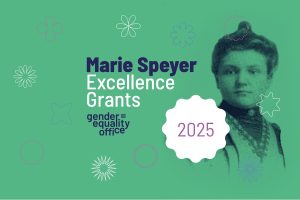This year, 61 researchers applied for a Marie Speyer Excellence Grant – the University’s grant scheme reserved for Uni.lu female researchers –, nearly twice as many as last year’s launch edition. The seven awardees represent Uni.lu’s diverse and interdisciplinary research environment, with women leading extraordinary scientific endeavours.
Four grant awardees will obtain a research fund of 130,000 euros each, while three scientists received a Seal of Excellence for their outstanding scientific quality.
I am very grateful to have received funding for my project DigiTRAD, which looks at how reactionary discourses about language, gender and the nation circulate on new media and are made appealing to youth in Luxembourg. It’s great how Uni.lu supports critical media research, and I am so excited that my project will also support two MA projects -and hopefully future PhD’s!
– Catherine Tebaldi
Congratulations to our Marie Speyer Excellence Grant Awardees
Catherine Tebaldi: Exploring how far-right ideologies around gender and language circulate on social media and resonate with youth.
The project DiGiTRAD responds to the pressing need for new knowledge and robust evidence about everyday extremisms or the role of media in the banalisation and circulation of far-right ideologies into everyday spaces and discourse. It looks at how banal metapragmatics – discussion of how we should talk and write become sites for a reactionary metapolitics appealing to youth.
Silvia Venditti: Investigating how fungi contribute to the breakdown of emerging water contaminants in nature-based systems.
Recently, Nature-based solutions (NBS) like funghi they have been applied to mitigate the threat brought by the occurrence of emerging contaminants in any water streams. The project FORGOTTEN aims to unveil the fungi community’s role in the direct biotransformation of emerging contaminants. The findings of this interdisciplinary research project will open a new route to application for a more innovative NBS design supported by a fungi augmentation strategy.
Sonja Malzner: How was knowledge about Africa popularised in Luxembourg within adult education, and what roles were played by various institutions and individuals? (1880–1980). The focus of the project KALPS is on examining the nature of the knowledge about Africa conveyed by various sociocultural intermediary. By focusing on popular culture as a case study,
the project aims to provide a significant building block for researching the widespread mediation of Africa in Luxembourg. The project will also assess the available material to determine whether expanding or continuing the project on a larger scale would be feasible and productive.
Aurélia Chenu: Analysing quantum measurement statistics to better understand open quantum systems and inform future quantum computing tools.
Aurelia Chenu’s team recently introduced new tools to benchmark quantum devices in the NISQ (noisy intermediate scale quantum) era. The project MeasFlux will refine understanding of the effect of measurement and noise on the statistics of the single quantum trajectory. The team aims to describe the full wave function evolution and characterise its deviation from the statistical average, to pave the way for new diagnose tools to diagnose dynamics in noisy systems.
Seal of Excellence Recipients
The following three projects were ranked among the top five and were awarded a Seal of Excellence – a strong endorsement of scientific merit:
-

-

-

Aikaterini Pantazatou
Project: Investigating hidden illegal assets through tax information exchange.
“My proposal was to test if toddlers’ (2-3 years old) brains are ready to begin reading acquisition, challenging the belief that educational reading practices should start at 5-7 years. This research could advance understanding of culturally induced brain plasticity in toddlers, linking neuroscience, education and home-literacy practices, and potentially help to prevent reading difficulties by early interventions.
– Aliette Lochy
About the Marie Speyer Grants of Excellence
The Uni.lu grants scheme, launched in 2024, provides financial support to female researchers working at the University. With this new grant scheme, the University combines its mission to support excellence and innovation in academia with two key objectives: to foster a diverse, gender-friendly and equal opportunities research environment, and to attract talent to Luxembourg.
